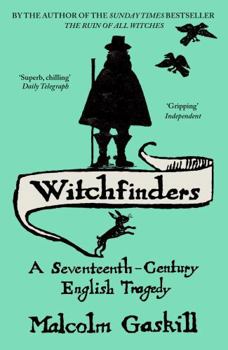Witchfinders: A Seventeenth-Century English Tragedy. Malcolm Gaskill
Select Format
Select Condition 
Book Overview
By spring 1645, two years of civil war had exacted a dreadful toll upon England. People lived in terror as disease and poverty spread, and the nation grew ever more politically divided. In a remote... This description may be from another edition of this product.
Format:Paperback
Language:English
ISBN:0719561213
ISBN13:9780719561214
Release Date:January 2006
Publisher:John Murray Publishers
Length:364 Pages
Weight:0.60 lbs.
Dimensions:0.6" x 5.1" x 7.8"
Customer Reviews
1 rating
The Sorry Truth Behind the Legend
Published by Thriftbooks.com User , 19 years ago
The Salem witch trials are famous, but they were extremely limited in scope, with few witches being executed. Hundreds more victims were caught in the witch hunting that occurred in the eastern counties of England in 1645 -1647. Like the Salem version, these witch trials have become the subject of drama, and mostly dramatic license; even those who know little of the history of Britain at the time of the English Civil War may well know Vincent Price playing the title role in _Witchfinder General_ (1968). It is no surprise that the movies got wrong the story of Matthew Hopkins (who proclaimed himself his nation's Witchfinder General), but legend-makers were getting Hopkins's story wrong immediately after his death. In _Witchfinders: A Seventeenth Century English Tragedy_ (Harvard University Press), historian Malcolm Gaskill has told it factually, and it is indeed a frightening tale, not just for the participants of the time, but for us all. Gaskill has wisely put the story in its historical context, and finds that our world continues to make contexts in which persecuting and murdering witches is acceptable justice. Worry about witches long preceded these particular persecutions. Witchcraft had been a specific crime for a century by the time Hopkins and his partner John Stearne began their hunts, but suspicion of Catholics and political and economic crises gave the pair a market. They were hired consultants, who, when communities suspected witches, would ride in, find the court-presentable evidence in the cases, and then allow justice to begin. Witches would be subject to all the ills of standard prisons, which as described here were hellish, not only starving their inmates but exposing them to squalor and illness. They would be tortured and sleep deprived, and could thereby confess to all sorts of fanciful crimes. It is unsurprising that confessions were fully consistent with the folklore of the age, having to do with the imps kept by the witches, the cats, mice, dogs, or insects that were Satan's ambassadors, kept and fed by the witch. The imps were bothersome in themselves, acting as vampires sucking blood from the witches who kept them, and body searches for finding the "teats" whereon the imps sucked were important sources of evidence. Any lump or bump would do. Hopkins and Stearne's spree was short-lived, and Gaskill shows that the chief reason for the end to the practice was not a boom in rationality but simply an acknowledgement of economics. Communities had to pay for the witchfinders' services, and for the jailing of the witches, and their trials and their eventual hangings. The witches, always poor folk, had no resources from which to pull costs by fines. It became clear that the benefits of pursuing witches were outweighed by the financial costs of doing so. Stearne died in obscurity, and the more famous Hopkins died of simple tuberculosis as the witch fad was dying out in 1647. That wasn't good enough; legends quickl





